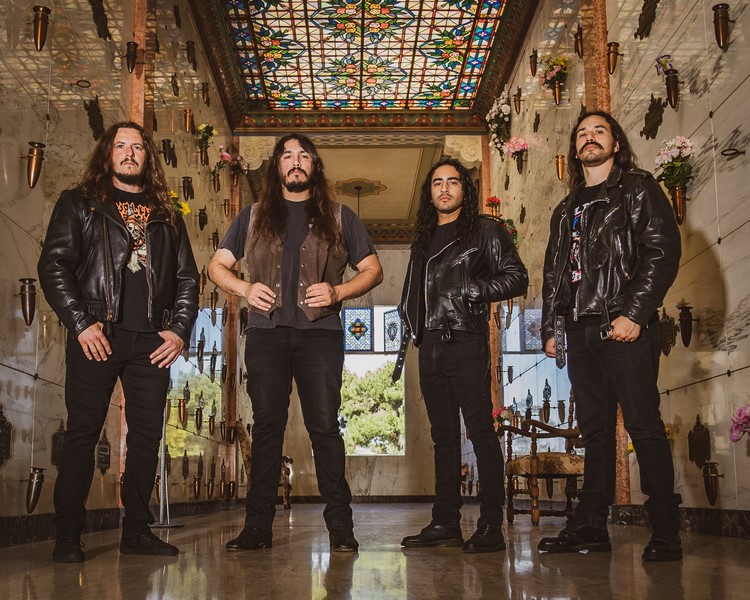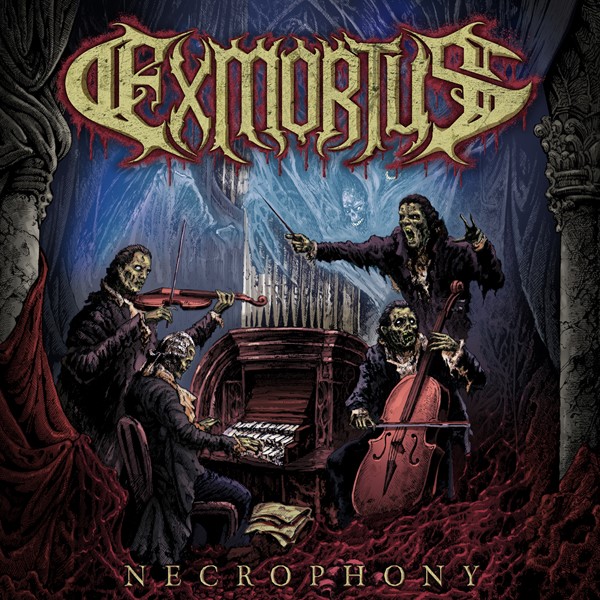 Hi! Necrophony marks a significant turning point for EXMORTUS, both in terms of musical direction and signing with Nuclear Blast. How would you describe the evolution of the band’s sound on this album and what led to this shift?
Hi! Necrophony marks a significant turning point for EXMORTUS, both in terms of musical direction and signing with Nuclear Blast. How would you describe the evolution of the band’s sound on this album and what led to this shift?
Hello! We’re honored and stoked to be on Nuclear Blast’s roster. So, to begin this new cycle, we chose to showcase different aspects of our sound. I don’t think we’re straying far at all from what we’ve already established with say Slave to the Sword but rather we’re expanding on it.
The album title, Necrophony, combines the words “necro” and “phony,” suggesting a dark and deceitful atmosphere. Can you elaborate on the lyrical themes and concepts explored in the album, and how they reflect the current state of the world?
My cousin (Mario the original drummer) and I loved the idea of writing a “symphony of the dead” but the title “Necrophony” never fit with the music or lyrical content of our previous albums. We usually draw our inspiration from heroic deeds of myth and legend. But then, 2020 happened and since then we felt it fitting to turn to the “dark side” for the new piece of work. Now we’re focused on cursed tragic figures that may or may not seek redemption. Horror movies like Evil Dead and Dracula, and authors like Lovecraft and Poe were also very much inspiring at this time. For example, our Poe inspired “Mask of Red Death” is an obvious reflection of the times.
The album features a cover of Greek-American composer Yanni’s interpretation of Vivaldi’s “Summer.” What inspired you to include this unique rendition, and how does it fit within the overall context of Necrophony?
My cousin and I had always wanted to cover this version of Vivaldi’s popular piece. We thought “how awesome would this sound on heavy metal guitars and drums?” While it would have fit in with any of our albums, we never got around to it. So, now with the classical kind of title “Necrophony,” there’s no better time to realize it.
With Necrophony, EXMORTUS delves into darker territories, drawing influences from Lovecraftian and Tolkien-esque tales. How did these influences shape the songwriting process, and what elements do you incorporate to create a more nefarious atmosphere?
Aside from delving into darker lyrical content, I also made use of darker harmonic techniques with my riffs and motifs. Altering a major chord to minor within a natural diatonic scale does the trick. Also, prolonging or not “resolving” leading-tone chord progressions retains a cool dissonance within a song.
The band has been known for its heroic fantasy/sword & sorcery aesthetic in the past. How did you approach transitioning from that style to a darker and more sinister thematic direction? What challenges did you face in embracing this new artistic vision?
With most of our work dealing with sword & sorcery, we still had darker tones in our music and lyrics sprinkled around. The real transition came with our EP “Legions of the Undead.” “Swallow Your Soul” was inspired by “Evil Dead 2” and the title track by the Army of the Dead in Tolkien’s “The Return of the King.”
Zack Ohren, who has worked with you on previous albums, returned as an engineer, producer, mixer, and mastering ace for Necrophony. How did his involvement contribute to capturing the essence of the album’s sound, and what makes your collaboration with him so successful?
We simply love working with him. We clicked, even with our first project together (Slave to the Sword). It’s just easy to communicate with someone who shares so many favorite artists. He has great input and always finds a way to get the best takes out of us, too.
The album features a range of songs, from shorter bursts of bravado to longer, more expansive tracks. How do you balance the pacing and structure of the album to create a cohesive listening experience?
This is the hardest part for me to figure out. Whatever order or structure I imagined at first never ends up being the final draft, which is a good thing. I sometimes obsess over certain ideas and structures that it takes the rest of the band’s input to show me that some ideas don’t always work best in the bigger picture. However, one idea that has been working out well is the transformation of established musical themes and motifs that are scattered throughout the album. There are so many variations of a single idea that you may or may not notice it in your first listen. I believe this technique creates a cohesive element that allows for an organic listen from start to finish. Maybe it’ll inspire multiple playthroughs, so listeners can try to catch all these variations.
EXMORTUS has toured with notable bands such as Amon Amarth, Obituary, and Death Angel. How have these experiences influenced your growth as a band and shaped your approach to live performances?
To learn that some of our favorite acts are awesome people is just so inspiring. We learn something new with every tour and every band whether it is to improve our ethics, performance and even writing music.
With four years in the making, how did the prolonged creative process of Necrophony impact the final product? Did it allow for more experimentation and refinement, or did it present its own set of challenges?
We took some breaks during the pandemic. We wanted to wait it out. We felt hopeless, to be quite honest. We really had to bring ourselves out of that negative mentality to carry on. But after much needed personal growth and rekindled hope, we met our deadline to finish the album. A lot of time had passed of course, more so than any other album that we’ve done but the actual writing process was the same. We don’t really “experiment” much; we just share and jam out ideas. If we all dig it then it makes it on the record, if not we save it for future releases or just scrap it entirely. We usually fine tune ideas when it’s super close to the recording deadline. Probably a bad habit, but I feel there’s some magic in those last-minute bursts of inspiration.
The album artwork for Necrophony showcases a visually striking and dark aesthetic. Could you shed some light on the inspiration behind the artwork and how it relates to the album’s themes and music?
Even though we’re known for our neoclassical sound, I believe this album emphasized that more so than ever. The use of transformed motifs and themes scattered throughout, songs in classical sonata form, a Vivaldi cover, and even a waltz really make this album stand out for us. We felt it was time to express that in our artwork finally. The undead ensemble in a way represents us four band members. Even after death, we never cease to perform our musical duties.
With the release of lead-off single “Oathbreaker” and follow-on singles like “Mind of Metal” and “Storm of Strings,” what aspects of these songs do you feel best represent the overall sound and essence of Necrophony?
We love all the songs on the album, but these felt more “single worthy.” They are the shorter tunes but also quite varied. Each song has its own tempo, groove and atmosphere and we feel they are great teasers for the rest of the album. These tracks just scratch the surface.
Necrophony explores the fusion of Viennese sophistication with metal might. Can you explain how this blend manifests in the album’s sound and how you manage to strike a balance between the two?
I just really love classical music haha. I really like to write in sonata-form or use it as a guideline to shape my ideas. It can lend itself to great complexity, but I try not to do that for every piece. Good ol’ rock n roll phrasing and structures are necessary for heavy metal expression, too, I believe, so I try to keep that in mind when writing.
How do you ensure that the intricate guitar work and musicianship shine through without overshadowing the overall songwriting and atmosphere?
We are a very guitar-oriented band, but we do like to show off the drum and bass capabilities that our members have. We just try to give each other musical space in the songs. Sometimes everyone is blasting away which makes for intense thick textures, but we also like to let each one of us shine on their given the appropriate circumstance. We don’t follow a formula, really, the music dictates to us rather.
What does the popularity of fantasy literature and media suggest about our yearning for escape, the exploration of alternate worlds, and the role of imagination in shaping our perception of reality?
Escapism is certainly a way for me to cope. I escape in my music. I’m sure the rest of my bandmates and even all metalheads escape in the same way. Lots of musical and lyrical content back then and now have been inspired by the works of authors/artists during harsh times.
In the context of war, how do the themes of loss, sacrifice, and the consequences of violence prompt us to question the ethical dimensions of armed conflict and the nature of humanity’s innate tendency toward aggression?
It’s a grim reminder that we have yet to learn to work with one another beyond political borders. I, for one like to follow Bill & Ted’s wisdom of “be excellent to other.”
Looking ahead, what are your hopes and aspirations for the future of EXMORTUS? Are there any specific goals, collaborations, or musical directions you hope to explore in upcoming projects? Thank you for your time!
We’re hoping to continue a good relationship with Nuclear Blast and to make new connections with this new release. We simply aspire to hit the road and perform our music anywhere possible. We want to spread the Gospel of Shred! Thank you!
If you really would like to support Antichrist, you can just Share our article.
You can also support Antichrist by sending a couple bucks to cover some webhosting expenses. =>> PayPal




